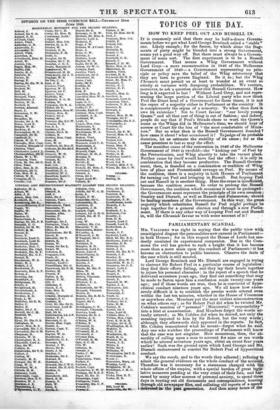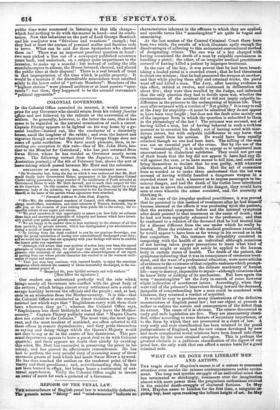PARLIAMENTARY SCANDAL.
Mn. VILLIERS VMS right in saying that the public view with unmitigated disgust the personalities now current in Parliament— in both Houses ; for in this respect the House of Lords has mo- destly emulated its experienced companion. But in the Com- mons the evil has grown to such a height that it has become more than a mere stain upon the conduct of Parliament-.-it has become an obstruction to public business. Observe the fads of
the case which is still mooted. • -
Lord George Bentinck and Mr. Disraeli are engaged in trying to obstruct Sir Robert Peel in a, particular course of legislation: they find their efforts failing, and they lay their heads together to injure his personal character: in the report of a speech that he delivered seventeen years ago, they find out Something that may be made to fasten upon him a confession made twenty-one years ago ; and if those words are true, then he is convicted of hypoL critical conduct nineteen years ago. We all know how exoefiL sively difficult it is to establish the precise words uttered evert within the last ten minutes, whether in the House of Commons or anywhere else. Members put the most violent misconstruction on what others say ; as Sir Robert Peel did when he twisted Mi. Cobden's mention of "personal" [Ministerial] "responsibility" into a hint at assassination. And Members forget the words-ae- tually uttered ; as Mr. Cobden did when he denied, not only the meaning: imputed to him by Sir Robert, but the very wonls although they afterwards dilly appeared in the reports. In fact, Mr. Cobden remembered what he meant—forgot what he said Any one who watches the proceedings of Parliament will know that the case was not singular. How monstrous, then, the ab- surdity of calling upon a man to account for nine or ten words which he uttered seventeen years ago, about an event four years earlier! Such was the ground upon which Lord George and Mr. Disraeli endeavoured to convict Sir Robert Peel of hypocritical conduct.
We say the reorde, and to the words they adhered ; refusing to admit the general evidence on the whole conduct of the accused. Therefore was it necessary for a statesman charged with the whole affairs of the empire, with a special burden of great legis- lative measures pending at the very crisis of their fate, and her- rassed by many other sources of personal anxiety, to spend three days in routing out old documents and correspondence, hunting through old newspaper files, and collating old reports of a speech delivered in the past generation. And then many hours of the public time were consumed in listening to that idle charge— which had nothing to do with the matter in hand—and its confu- tation. Now this behaviour on the part of Lord George Bentinck and his coadjutor was "frivolous and vexatious" enough ; but they had at least the excuse of personal malice and factious ends to serve. What can be said for those bystanders who cheered them on ? There was an important practical question in hand : two men picked a line out of a newspaper published seventeen years back, and undertook, on a subject quite impertinent to the occasion, to make up a scandal : but instead of calling the idle scandalmongers to silence, the House listened, cheered, and placed the public time at their disposal ! There is a real breach of trust in that impropriation of the time which is public property. It would be a mistake if the discreditable misconduct were ascribed solely to the lower order of "private Members": Members of the "highest station" were pleased auditors or at least passive "spec- tators ": but then, they happened to be the accused statesman's "political opponents."



























 Previous page
Previous page